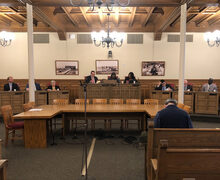How the Israeli filmmaker controversy has resonated with the Syracuse University community
Daily Orange Stock Photo
Syracuse University reverses decision to disinvite Israeli filmmaker Shimon Dotan on Friday.
At the annual Sundance Film Festival in January, Shimon Dotan was approached by William Blizek, a University of Nebraska Omaha professor.
Impressed by Dotan’s film “The Settlers,” which sheds light on the history of Israeli settlements on the West Bank and the movement’s development, Blizek, a philosophy and history professor, wanted to screen the film at “The Place of Religion in Film,” an international conference to be hosted by Syracuse University in March 2017.
“He thought it was a valuable project and a very important film,” said Dotan, an Israeli filmmaker who also teaches political cinema at New York University’s graduate school of journalism.
Dotan was interested in showing his film at the conference and kept in touch with Blizek.
Then he learned he was no longer welcome to attend the conference when an SU professor told him that she was concerned about the potential political reaction on campus, particularly from the anti-Israeli Boycott, Divestment and Sanctions (BDS) movement.
The disinvitation, first reported Thursday by The Atlantic, raised concerns as to whether SU had become the latest example of a university whose academic freedom was compromised by a small portion of campus. Since the story’s publication, the university has been in the national and global spotlight as questions lingered over its commitment to academic freedom. After much public scrutiny, the university reversed its decision and plans to invite Dotan to screen the film.
M. Gail Hamner, a religion professor at SU and an organizer of the conference, sent an email to Dotan on June 24, telling him that she had not seen the film and that she would lose credibility with her colleagues if she vouched for the film without seeing it first, according to The Atlantic article.
In negating the invitation, Hamner said she feared that anti-Israeli BDS supporters on campus would “make matters very unpleasant” for Dotan and her. She wrote in the email the she felt “tremendous shame” in rescinding the invitation.
“I feel caught in an ideological matrix and by my own egoic needs to sustain certain institutional affiliations,” Hamner wrote, according to The Atlantic article.
“I was very surprised, to say the least,” Dotan said in an interview with The Daily Orange. “In every possible way, it’s wrong on content. It’s wrong on form.”
Dotan said he was “puzzled” that Hamner didn’t ask him to send her the film, because he typically receives requests to submit his film to festivals beforehand to see whether the film is appropriate for the given occasion.
Hamner released a statement Friday apologizing for the disinvitation, adding that she didn’t realize it was standard protocol to watch the film. She said that was a result of her “bad judgment” and inexperience in organizing conferences.
In every possible way, it’s wrong on content. It’s wrong on form.Shimon Dotan
Zachary Braiterman, chair of the Jewish studies program at SU, however, argued that The Atlantic article created a controversy where there isn’t one.
Braiterman said he spoke with Hamner, who had expressed initial interest in Dotan’s film.
“It was on that conversation and conversations that she must have had with other colleagues where she came to the conclusion that, having not seen the film, she was in no position to vouch for it,” Braiterman said.
Braiterman added that he was probably among Hamner’s many colleagues who warned her that she would be confronted with political questions about Israel and its representation if she wanted to show anything about the country on campus.
“This just simply reflects the reality of this terrible thing called the Israeli-Palestinian conflict, which has gone unresolved,” Braiterman said.
The Israel-Palestinian conflict has been a controversial topic of discussion for decades. On college campuses nationwide, the topic has frequently become a subject of heated discussions between pro-Israel and pro-Palestine students as well as faculty members.
The BDS movement, according to its website, is “a Palestinian-led movement for freedom, justice and equality.” It was established in 2005 by Palestinian civil society organizations urging boycotts, divestment and sanctions to pose non-violent pressure on Israel, according to the website.
Back in 2014, then-Interim Chancellor and Provost Eric Spina announced SU does not support the boycott of Israeli academic institutions.
After The Atlantic article’s publication, a handful of media organizations — including The Huffington Post, The Chronicle of Higher Education, Israeli-newspaper Haaretz and conservative blog The Legal Insurrection —picked up the story.
By Friday, the university was under pressure to squash the controversy. Vice Chancellor and Provost Michele Wheatly sent an email to the university community calling Hamner’s original decision inconsistent with SU’s “policies, ideals, and practices” and assuring the university’s support of academic freedom.
I allowed my own fear of controversy to rule over good judgment and good teaching.M. Gail Hamner
Hamner, the religion professor who is at the center of the controversy, said in her statement she was too concerned with consequences of sparking activism on campus and how others would react about settlements on the West Bank, which she described as “a highly complex and emotional Middle East issue.”
“I allowed my own fear of controversy to rule over good judgment and good teaching,” Hamner wrote.
Hamner did not respond to The Daily Orange’s requests for comment, other than sending the statement.
Miriam Elman, a political science professor at the Maxwell School of Citizenship and Public Affairs who specializes in Israel-Palestine conflict, said her immediate reaction to the incident was to issue a personal apology as a member of the College of Arts and Sciences and wanted to make clear to Dotan that what happened was not indicative of the way the university handles business on campus.
“I saw that as an insult, as he did, in a non-collegial way of treating a fellow member of the academy,” Elman said.
The bottom line, Elman said, is that a faculty member acted out of fear of ideologically-motivated retaliation or isolation by some of her colleagues.
But Braiterman said that is not the case. Describing The Atlantic article as “flimsy,” Braiterman said the article uses quotes in her email as the primary evidence to suggest there is a chilling environment about Israel at SU.
“In my estimation, the idea that there is a chilling, anti-Israel environment at SU is a complete joke,” he said.
If the film were to be screened at an event on campus — for example, co-sponsored by multiple academic departments at SU — Braiterman said there would not be an issue. In this case, he said, the film was going to make a high-profile appearance at a university-wide symposium that requires higher stakes and standards.
Braiterman said he spoke with Hamner after the article was published. When asked what her reaction looked like, he said she was “horrified, shocked (and) embarrassed.”
“You know Dotan is presenting himself as a victim in this story. And I think, frankly, it’s Professor Hamner who is the victim here,” he said. “In my estimation, she made the right professional decision.”
Portrayal of Hamner as being anti-Semitic and anti-Zionist is “simply unfounded and vicious,” Braiterman said.
Although Braiterman said there was no invitation extended, Dotan said a debate as to whether an invitation was extended or not is “irrelevant.”
“If (Professor Hamner) would think that I am not invited, then there’s not a point for writing the email altogether,” Dotan said. “Why would she bother?”
After The Atlantic article was published, a few parents of incoming freshmen had contacted the Hillel Jewish Student Union to ask whether SU is a safe environment for pro-Israel students, said Brian Small, director of Hillel.
“I can honestly tell them that I don’t believe that the climate has been created where they should feel uncomfortable about having students here,” Small said.
Roy Gutterman, an associate professor of communications law in the S.I. Newhouse School of Public Communications and First Amendment expert, said he regards SU as a place that embraces free speech values and encourages faculty to express themselves and address a wide variety of issues and viewpoints.
If you prevent voices that are not to your liking from being expressed, you find too soon that voices you do like will be prevented from being expressed as well.Shimon Dotan
Still, Gutterman said he thinks college campuses in general are dangerous for free speech issues between these types of counter protests and censorship.
“I think it’s a pretty dangerous place now for people with viewpoints that may offend somebody else,” Gutterman said.
Dotan also warned against the chilling effects on free speech.
“If you prevent voices that are not to your liking from being expressed, you find too soon that voices you do like will be prevented from being expressed as well,” Dotan said. “It’s a two-way street with devastating consequences.”
Elman, the political science professor, pointed out there have been no attempts made to disrupt or cancel speakers who have anti-Israeli views.
Jeffery Spivack, a former president of Israel-Palestine group LIME, said the disinvitation pushed by certain faculty members who “let their personal ideology take priority over academic enterprise” hindered an opportunity to show Dotan’s film.
Chandra Talpade Mohanty, chair and professor in the women and gender studies department, said in an email that the faculty within the department were involved neither in issuing nor rescinding the invitation to the filmmaker.
“Some of us support the BDS movement that calls for the end of Israeli occupation of Palestine; all of us, however, support academic freedom and believe in the Syracuse University tradition of free expression and discussion of ideas, no matter how controversial they may be,” Mohanty said.
Wheatly said in her email to the SU community that she and SU Chancellor Kent Syverud are coordinating with Karin Ruhlandt, dean of the College of Arts and Sciences, to invite Dotan to the SU campus to screen his film.
Dotan said he is happy to visit SU and wants everyone, including BDS activists, to come see the film and express their views.
“Syracuse University is not on my blacklist. No one is on my blacklist,” Dotan said. “Quite the contrary, I think it’s even more important today than before to present the film at Syracuse University and invite everybody: the right, the left, the center, the up (and) the down.”
Published on September 6, 2016 at 12:31 am
Contact Satoshi: ssugiyam@syr.edu | @SatoshiJournal





